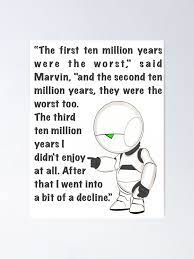It is not clear who first remarked that the stone age did not end for want of stones. I doubt I am the first to observe that Robot Writing—sometimes referred to as ChatGPT—does not presage the demise of first year composition classes or indeed the passing of carbon-based life forms putting pen to paper.
As best I understand it, the arguments against bothering to have students write essays any more goes something like this: we, their teachers, can no longer discern—in George McGovern’s memorable phrase—chicken salad from chicken shit. Take home essays, all homework assignments for that matter, might be written by students but the words just as easily could have been produced by Epicac. Since there is no way to discern whether a composition was written by an adolescent or Marvin the Paranoid Android, there is no point in assigning written work. Because there is no way to discern if students are cheating, we need to throw out not just the baby but the entire endeavor with the bath water.
Speaking of machines, here’s a link to a 1950 Kurt Vonnegut short story. I could be wrong, but I feel certain that it will be quite some time before a washing machine or a toaster writes something that makes me cry every time I read it.
Every equation you can think of can be solved by math software. Every number I wonder about—how else to people memorize license numbers?—can be factored by your smart phone. (899 is not prime. 899 is 29 times 31. 907 is prime. How cool is that? But the fact that your device can factor big numbers does not exclude your child from knowing her multiplication tables.) Your seventh grader still needs to know how to solve x + 3 = 5; your ninth grader should be able to factor x2 – 4x – 45; your high school senior needs to be able to find the derivative of x3 – 3x2 + 5x – 2. That computers can also solve these simple equations does not disqualify your children from knowing how to do so any more than the invention of airplanes precludes the need for us to walk. Indeed, unless I am much mistaken, there are some agreeable trails in our country’s National Parks where limos aren’t even allowed.
Which brings us as always to the subject of parenting: I have never met Josh Allen. Yet I am thoroughly convinced that he can throw a football farther than I can. (Josh if you’re reading my essay this week, let me know if we can get together and have a quick competition to confirm this point.) Just the same, I’m going to throw a ball with my children. Could a Football Robot chuck the ball farther than I can? Sure. You wouldn’t even need to involve the Bills’ quarterback. A machine, Josh Allen, and most of the other dads in my neighborhood can all throw a ball better than I. But I am going to muddle through the afternoon and play catch with my children just the same. Call me old-fashioned.
Maybe I’ve gone off the path of my argument that Robot Writing won’t immediately displace student writing. Such things happen. I have frequently been accused of introducing conversational topics “apropos of nothing” both in the classroom and at the breakfast after the Saturday morning run. So let me be direct: there is still a place in 2023 for students learning how to express themselves with written words. Even though computers can do it better. Students should still know how to solve quadratic equations, even though machines can find the answers faster. Parents should continue to interact with their children—throwing a ball, reading a bed time story, making cookies, going for a hike.
I’m pretty sure there’s no app for that.






3 thoughts on “The Stone Age and ChatGPT”
ChatGPT works best with the assistance of Emetrol.
I love your blogs and writing. Thank you for pushing our thinking. Yesterday I found some great benefit to utilizing ChatGPT to assist in kickstarting a bit of a writing process block for me, and it was incredibly, surprisingly helpful. It was almost like “newsjacking”, where the story is already written for you, but then I just needed to add my perspective and personality to it. That is how I’m seeing this AI being helpful to my writing at this point, it will be wild to watch where it goes in the future. What you are saying is so absolutely spot on I couldn’t love this more. And of course, no way could anything but your mind have come up with it. Thank you for taking the time to write such profound and thoughtful works of art.
David, these are valid assertions (or at least I agree with them). People seem to forget that AI is simply a tool. “Robot Writing” is an apt description. Even GPT4 can only create as much value as the prompt writer can imbue or ferret out of it–or into it.
What actually excites me about AI as a tool is that the answers are only as good as the questions. This means that knowing how to effectively communicate will still be the key in harnessing the power of the tool. The beautiful paradox is that for the new 21st century tech to reach its maximum usefulness, humans will find it necessary to return to older–previously thought by some to be antiquated–forms of reading, writing and logic. We will still need to learn how to think holistically, perceive creatively and adjust inquiry accordingly to make use of the tool.
Some may give their autonomy and decision-making to the almighty AI, and I do worry a little for what shapes those outcomes will take. On the other side, those that retain their autonomy will naturally follow the paths of inquiry upon which the concept of human learning is based.